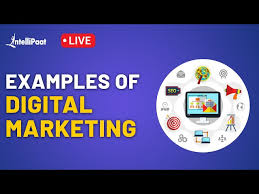Examples of Digital Marketing
Digital marketing has become an essential component of any successful business strategy in today’s digital age. Leveraging various online channels and tactics, businesses can reach their target audience effectively and drive engagement. Here are some examples of digital marketing that have proven to be highly effective:
Social Media Marketing
Social media platforms like Facebook, Instagram, Twitter, and LinkedIn offer powerful tools for businesses to connect with their audience, build brand awareness, and drive traffic to their websites. Through targeted advertising and engaging content, social media marketing can help businesses reach a wider audience and generate leads.
Search Engine Optimization (SEO)
SEO is the practice of optimizing a website to rank higher in search engine results pages (SERPs). By using relevant keywords, creating high-quality content, and improving website performance, businesses can increase their visibility online and attract organic traffic from search engines like Google.
Email Marketing
Email marketing remains a powerful tool for nurturing leads and building customer relationships. By sending personalised emails to subscribers with relevant content and offers, businesses can drive conversions and retain customers over time.
Pay-Per-Click Advertising (PPC)
PPC advertising allows businesses to display ads on search engines or other platforms and pay a fee each time a user clicks on their ad. This model enables businesses to target specific keywords or demographics and track the performance of their campaigns in real-time.
Content Marketing
Content marketing involves creating valuable and relevant content to attract and engage a target audience. By producing blog posts, videos, infographics, or other types of content that resonate with users’ interests, businesses can establish themselves as industry experts and drive traffic to their websites.
In conclusion, digital marketing offers a wide range of opportunities for businesses to connect with consumers in meaningful ways. By utilising these examples of digital marketing effectively, businesses can enhance their online presence, drive sales, and achieve long-term success in the digital landscape.
Six Effective Digital Marketing Strategies to Boost Engagement and Drive Sales
- Utilize social media platforms to engage with your audience and promote your products or services.
- Create high-quality content that is relevant to your target market to attract and retain customers.
- Optimize your website for search engines to improve visibility and drive organic traffic.
- Run targeted online advertising campaigns to reach specific demographics and increase conversions.
- Implement email marketing strategies to nurture leads, build relationships, and drive sales.
- Analyse data regularly to track the performance of your digital marketing efforts and make informed decisions.
Utilize social media platforms to engage with your audience and promote your products or services.
To maximise the impact of your digital marketing efforts, it is crucial to leverage social media platforms effectively. By actively engaging with your audience on platforms such as Facebook, Instagram, Twitter, and LinkedIn, you can build meaningful relationships with customers and prospects. Through strategic content creation and targeted advertising, businesses can promote their products or services in a way that resonates with their target market, ultimately driving brand awareness and customer loyalty. Social media provides a powerful channel for businesses to showcase their offerings and connect with consumers on a personal level, fostering trust and credibility in the digital space.
Create high-quality content that is relevant to your target market to attract and retain customers.
Creating high-quality content that is tailored to the interests and needs of your target market is a crucial aspect of digital marketing. By providing valuable and relevant content, businesses can not only attract the attention of potential customers but also build trust and loyalty among existing ones. Whether it’s informative blog posts, engaging videos, or interactive infographics, delivering content that resonates with your audience can help establish your brand as a credible source of information and solutions, ultimately leading to increased customer retention and long-term success in the competitive digital landscape.
Optimize your website for search engines to improve visibility and drive organic traffic.
Optimising your website for search engines is a crucial aspect of digital marketing that can significantly impact your online visibility and drive organic traffic to your site. By implementing effective search engine optimisation (SEO) strategies such as using relevant keywords, creating high-quality content, and improving site performance, you can enhance your website’s ranking on search engine results pages. This increased visibility not only helps potential customers find your website more easily but also establishes credibility and trust with search engines, ultimately leading to sustainable organic traffic growth over time.
Run targeted online advertising campaigns to reach specific demographics and increase conversions.
To maximise the effectiveness of your digital marketing efforts, consider running targeted online advertising campaigns tailored to reach specific demographics. By identifying and focusing on your ideal audience, you can deliver personalised messages that resonate with their interests and needs. This approach not only increases the likelihood of engaging with potential customers but also boosts conversions by directing relevant traffic to your website or landing pages. By leveraging targeted online advertising, businesses can enhance their marketing ROI and achieve measurable results in reaching their desired demographic segments.
Implement email marketing strategies to nurture leads, build relationships, and drive sales.
Implementing email marketing strategies is a crucial component of a comprehensive digital marketing plan. By utilising targeted and personalised emails, businesses can nurture leads, establish trust with their audience, and ultimately drive sales. Email marketing allows for direct communication with potential customers, providing valuable information, promotions, and updates that keep them engaged and interested in the brand. Through strategic email campaigns, businesses can build long-lasting relationships with their audience and guide them through the sales funnel towards conversion.
Analyse data regularly to track the performance of your digital marketing efforts and make informed decisions.
Regularly analysing data is crucial in digital marketing to evaluate the effectiveness of your strategies and make informed decisions. By tracking key performance metrics such as website traffic, conversion rates, and engagement levels, businesses can gain valuable insights into what is working well and where improvements are needed. This data-driven approach allows businesses to optimise their digital marketing efforts, allocate resources more effectively, and ultimately achieve better results in reaching their target audience and achieving their business goals.



